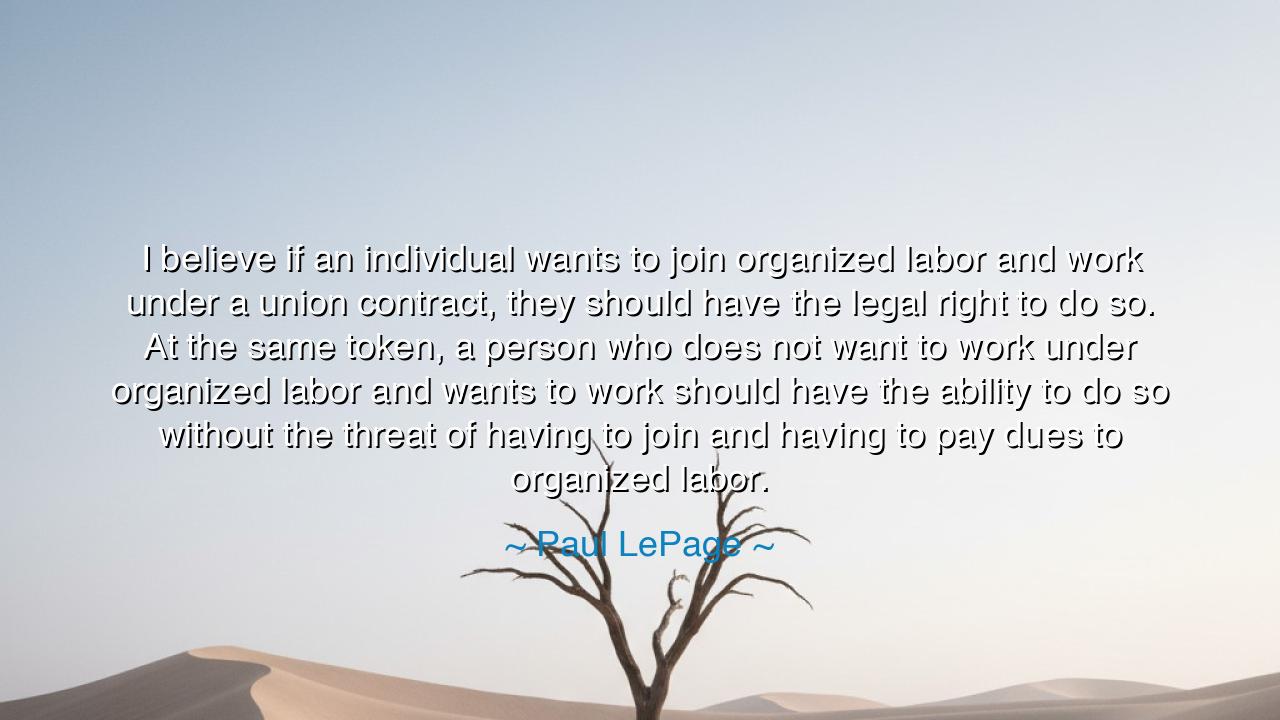
I believe if an individual wants to join organized labor and work
I believe if an individual wants to join organized labor and work under a union contract, they should have the legal right to do so. At the same token, a person who does not want to work under organized labor and wants to work should have the ability to do so without the threat of having to join and having to pay dues to organized labor.






In the words of Paul LePage: “I believe if an individual wants to join organized labor and work under a union contract, they should have the legal right to do so. At the same token, a person who does not want to work under organized labor and wants to work should have the ability to do so without the threat of having to join and having to pay dues to organized labor.” These words strike at the heart of one of the oldest struggles in the life of societies: the tension between the freedom of the individual and the strength of the collective. LePage acknowledges the value of labor unions while warning against the coercion that may arise when freedom of choice is diminished.
The ancients themselves debated this balance. In the city-states of Greece, the people joined together in assemblies to protect their rights against the power of kings and tyrants. Yet even then, a tension endured: could the citizen stand apart from the will of the collective? LePage’s words remind us that while unity in labor brings power to the weak, unity must never come at the cost of crushing the independence of the one. True justice, he suggests, allows both paths: the right to band together and the right to stand apart.
The history of organized labor is one of suffering, courage, and triumph. In the mills and mines of the 19th century, workers toiled for starvation wages, their children forced into labor, their safety disregarded. It was only by forming unions, by joining strength to strength, that they won shorter hours, safer conditions, and fairer pay. Without unions, the worker remained voiceless before the factory owner. Thus, the right to join a union contract is sacred, purchased with blood and endurance. To deny it would be to erase the progress of generations.
And yet, there have been times when unions themselves, drunk with power, forgot their original mission. In some industries, those who sought only to labor freely without membership were harassed, fined, or barred from work. Stories abound of individuals who faced threats because they refused to pay dues or bend to the will of the collective. Here too lies truth: the freedom to join must be matched by the freedom not to join. For just as tyranny may come from kings or bosses, it can also emerge from within the collective when it demands submission without consent.
The deeper meaning of this quote is that liberty must be a balance between rights and responsibilities. The right to join organized labor secures justice for many, but the right to remain outside secures justice for the one. A society that honors both proves itself wise, for it neither weakens the strength of unions nor sacrifices the dignity of the individual. This balance is fragile, and when neglected, it produces either exploitation by employers or oppression by organizations meant to defend the worker.
History gives us many warnings. In Soviet Russia, all labor was organized, yet the individual had no freedom; unions existed in name, but they were arms of the state, enforcing obedience rather than protecting rights. By contrast, in unregulated early capitalism, the absence of labor organization brought misery and despair to countless families. The lesson is plain: extremes on either side destroy balance. True freedom requires space for both the collective voice and the individual choice.
So let this teaching endure: honor the sacrifices of those who built the strength of unions, but do not let their victories become a new form of coercion. Defend always the legal right of every person—to stand with their brothers and sisters in solidarity if they so choose, or to walk their own path if they desire independence. In your own life, respect both choices, and remember that the greatness of a society lies not in forcing one way upon all, but in safeguarding the freedom of each to choose. For in the harmony between the one and the many lies the true justice of the people.






AAdministratorAdministrator
Welcome, honored guests. Please leave a comment, we will respond soon